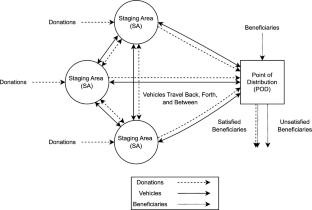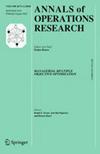Vehicle dispatching policies for last mile distribution in a disaster-relief supply chain network
Abstract
This study considers the impact of supply and demand uncertainty on last-mile distribution in a disaster-relief supply chain with multiple Staging Areas (SAs) and one Point of Distribution (POD). The SAs function as temporary warehouses for receiving and organizing relief supplies that are subsequently transported to the POD where they are distributed to meet the stochastic demands of disaster survivors. The goal of this paper is to evaluate the effectiveness of policies for dispatching vehicles from the SAs to the POD in an effort to minimize unsatisfied demand at the POD. Prior literature suggests that continuously dispatching vehicles is an effective and pragmatic policy, but it has not been tested on a relief network with multiple Staging Areas. This study establishes criteria under which continuous dispatching (CD) is an optimal policy and examines its performance through computational experiments. We solve problem instances using approximate dynamic programming since the stochastic dynamic programming model cannot be solved directly. Our findings suggest that the CD policy does not perform as well as in previous studies, but may be the best available option from a practical perspective.


 求助内容:
求助内容: 应助结果提醒方式:
应助结果提醒方式:


